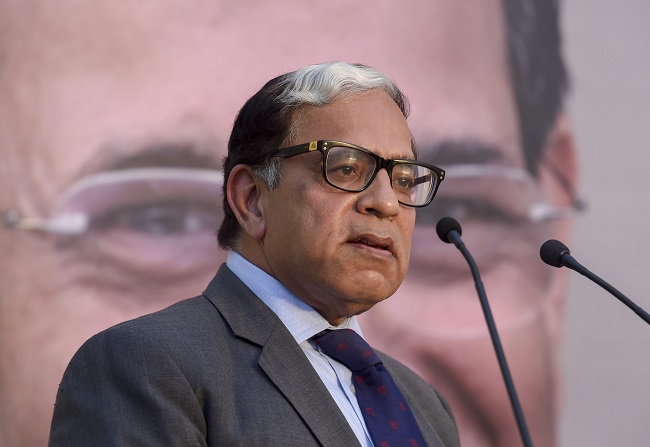
Justice Lalit Suri and Justice AK Sikri have put too much faith in their notion of “righteousness” and have opted to turn their back on call of duty. While a section of media may continue its slanderous reporting but that should not set the trend of abdication of one’s duty.
Munshi Premchand, the greatest Hindi writer of all times has a message for Justice Lalit Suri and Justice Sikri in his story – ‘Panch Parmeshwar’. The message is that once you sit in judgement, you become God and, in that role, you must put aside your prejudice and preferences, sift facts objectively and judge acts of omission fairly and fearlessly, irrespective of who has committed them and how others would take it if your verdict goes against them. It is obvious neither of the judges fit into Premchand’s idea of a Panch. Both of them recused themselves recently — one from hearing the Ram Janam Bhoomi case and the other from accepting the prestigious nomination for the Commonwealth Arbitral Tribunal – fearing that they will be accused of lacking in intellectual integrity and delivering coloured judgements.
Justice Lalit opted out of the five-member Constitution Bench that was to hear the Ram Janam Bhoomi land dispute, literally in panic. It happened minutes before the hearing began when it was pointed out that as a lawyer, he had pleaded on behalf of Kalyan Singh, then UP Chief Minister, in a case of contempt of court relating to the demolition of Babri Masjid in 1992. Justice Lalit insisted that it would be inappropriate for him to continue on the bench for he would be seen as favouring the BJP. By his logic, lawyers should not become judges in India, for they would have to frequently recuse themselves from hearing cases of clients whose cases they handled in courts from time to time. The question is, where do you draw the line and what should constitute as irrefutable reason for recusal. Can it be your religion, your caste, the state you come from, your friends, family or your ideological persuasions?
Justice Lalit may be thinking that he has taken a high moral ground but it is not so. He would have gone higher in national esteem had he risen above his professional association with his client, Kalyan Singh and wrote out a reasoned, balanced judgement based on incontrovertible facts in a case that has kept the nation on communal boil for decades. Unfortunately, he chose the easier route. He was afraid that he would be criticised for sympathising with crusaders of constructing Ram Mandir on the disputed site in Ayodhya. Apparently, he was more concerned about what denigrators would say and had no belief in his intellectual integrity and sense of objectivity.
Justice A K Sikri’s case is even more inexplicable. As a member of the selection committee he had concurred with Prime Minister Narendra Modi to remove Alok Verma as Director of the CBI. The third member was Mallikarjun Kharge of the Congress who disagreed with the majority view. Typical of the slanderous standards of our media reporting, Justice Sikri was accused of siding with the PM Modi to return a favour that PM had bestowed on him by nominating him as a member of the London-based Arbitral Tribunal in the Commonwealth Secretariat. Instead of ignoring this rubbish, Justice Sikri rushed to the press. He explained that the Tribunal membership was not a plum job and that his consent had been taken much before he even knew that that he would be part of a committee that would terminate Alok Verma’s unsavoury dalliance with the CBI.
Justice Sikri did not stop at that. He withdrew his consent to be India’s nominee at the Arbitral Tribunal in the Commonwealth Secretariat. In doing so, he not only let down the country but also encouraged the congenital baiters to hunt for another prey on another day. He forgot that in May 2018, he had set aside governor’s decision and reduced time from 15 days to 48 hours for the BJP leader to prove his majority in Karnataka Assembly, paving way for the Congress-JDS combine to form the government. Still, he was offered the membership of the tribunal by the incumbent NDA (National Democratic Alliance) because government decisions are never taken on the basis of what others feel but what is required to serve the interests of the nation.
Both Justices must be aware that all individuals have conflict of interest in their lives. But those who refuse to allow these conflicts to cloud their judgement make good leaders and they are remembered. I recall an ICS (Indian Civil Services) officer who had instructed the traffic police inspector to fine his wife for jumping the traffic signal and if she refused, put her in the lock up. During my college days I was an aggressive student leader fighting for the cause of students but that did not deter me from using force as an SP (Superintendent of Police) against the protesting students who were burning buses and looting shops.
All of us have preferences and prejudices which we acquire from the education we receive and the background we come from. But we do not abdicate our responsibilities, worrying that our decisions may be questioned and ridiculed. Justice Sikri and Justice Lalit seem to have put too much faith in their notion of righteousness and opted to turn their back on call of duty. We wanted them to be like Premchand’s Panch and dispense justice like Parmeshwar (God), unruffled by the noise in their surroundings. But Alas!
